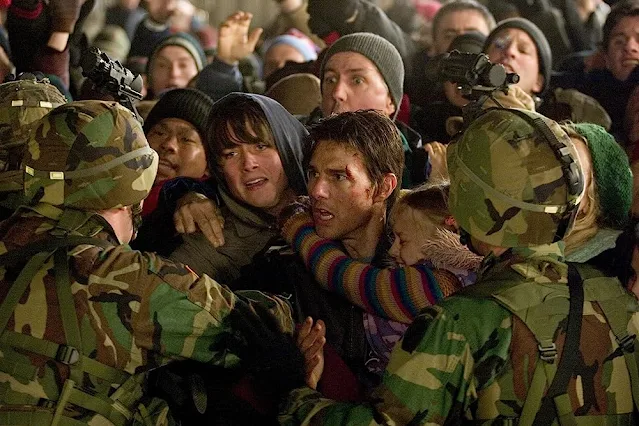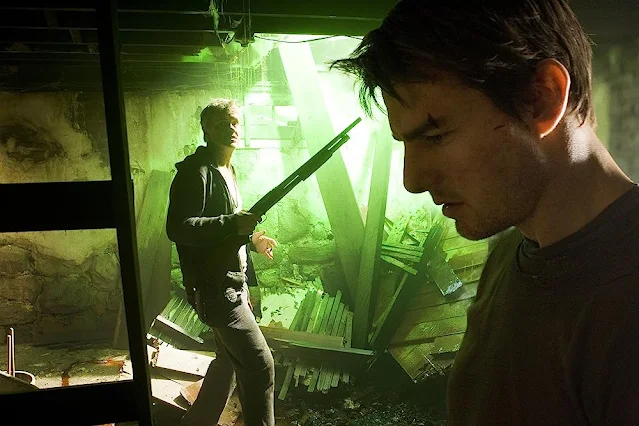Based on H.G. Wells' novel, "War of the Worlds" takes us on a thrilling journey through an alien invasion. Set in modern times, the film follows Ray Ferrier (played terrifically well by Tom Cruise), a divorced and flawed father who must protect his children amidst the chaos. Spielberg's adaptation maintains the relevance of the source material while catering to contemporary audiences. The film masterfully captures the vulnerability of Earth as technologically advanced aliens lay waste to cities and evoke a sense of global panic.
Survival and Human Nature
Survival becomes a central theme in "War of the Worlds." As the characters face the relentless alien onslaught, their true nature emerges. Spielberg skillfully portrays the primal fear and resilience of humanity in the face of unimaginable circumstances. For instance, in a particularly intense scene, Ray and his children witness the initial attack on the city. The camera captures their terrified expressions as buildings crumble and chaos erupts, illustrating the overwhelming nature of the threat.The film explores how survival instincts can bring out both the best and worst in people, showcasing acts of selflessness and heroism alongside instances of selfishness and betrayal.
Family and Redemption
The theme of family dynamics and the quest for redemption permeate "War of the Worlds." Ray Ferrier, initially an estranged and flawed father, undergoes a profound transformation as he fights to protect his children. Spielberg portrays the complexities of familial relationships amidst the chaos of an alien invasion, evoking deep emotional resonance in the audience.One poignant moment occurs when Ray risks his life to rescue his daughter, Rachel, who is trapped in a precarious situation. His determination to protect and reunite with his children reflects the primal instinct of a parent's love. Through their shared hardships, Ray learns, finally, the value of family and finds redemption in his role as a father.
Desperation and Loss of Humanity
"War of the Worlds" explores the theme of desperation and the loss of humanity in the face of a catastrophic event. As the alien invasion unfolds, society crumbles, and individuals are pushed to their limits. Spielberg depicts the breakdown of social order, where survival becomes the primary instinct, leading to acts of desperation and moral compromise.
The film showcases instances where characters resort to theft, violence, and even abandoning others in order to ensure their own survival.
Harlan Ogilvy serves as a compelling embodiment of the theme of desperation and the loss of humanity. Ogilvy, played by Tim Robbins, is a man Ray and his daughter encounter during their journey. Initially, he appears as a fellow survivor seeking refuge. However, as the film progresses, Ogilvy's behavior becomes increasingly erratic and desperate.
He succumbs to paranoia and isolation, losing touch with his humanity in the process. Ogilvy's descent into madness and his eventual violent actions showcase the destructive effects of desperation and the erosion of moral values in extreme circumstances. His character serves as a haunting reminder of the potential darkness that can emerge in individuals when pushed to the brink, underscoring the film's exploration of the theme of desperation and loss of humanity.
The character reminds us somewhat of Howard Stamble from Cloverfield Lane.
Existential Dread and Powerlessness
"War of the Worlds" confronts viewers with the theme of existential dread and the overwhelming sense of powerlessness. The alien invasion presents humanity with an existential threat that defies comprehension and control. Spielberg skillfully portrays the terror and helplessness experienced by the characters as they confront an enemy far superior in technology and strength.
Moments in the film, such as when Ray and his son witness the disintegration of human bodies vaporized by the aliens' heat rays, evoke a deep sense of powerlessness and insignificance in the face of cosmic forces. This theme invites reflection on the human condition and our place in the universe, highlighting the fragility of existence and the inherent vulnerability of humanity.
Soylent Green is people! The aliens are here to use humans as fertilizer
In the thematic context of Spielberg's "War of the Worlds," the concept of aliens waiting to harvest humans is laden with profound implications, weaving a tapestry of existential dread and philosophical contemplation.
This chilling premise transforms the alien invasion from a mere cataclysmic event into a metaphor for the human condition within the vast cosmic order. It presents humanity not as the dominant species, but as mere livestock, unwittingly nurtured over millennia for alien consumption. This notion challenges our perceptions of significance and autonomy, framing our entire history as a prelude to an inevitable harvest.
It evokes a sense of vulnerability and insignificance, compelling us to confront the fragility of human existence and the illusion of control over our destiny. This perspective also mirrors the ethical considerations of our own treatment of other species, subtly critiquing the human tendency to view other forms of life as resources.
In essence, this concept weaves existential horror into the fabric of the narrative, positioning the film not only as a science fiction thriller but as a profound exploration of the human psyche and our place in a potentially indifferent universe.
By incorporating elements that mirror real-world concerns, Spielberg creates a film that provokes thought and discussion on the state of humanity and the potential risks we face. "War of the Worlds" serves as a reminder of our fragility and the importance of balance between our technological advancements and our responsibility towards the world we inhabit.
Conclusion
"War of the Worlds" stands as a testament to Steven Spielberg's directorial prowess. By exploring themes of survival, human nature, family, redemption, and the consequences of technology, the film engages viewers on multiple levels. The film's memorable moments and powerful themes remind us of our fragility, our capacity for growth, and the potential dangers that lie within our own progress.
Through captivating visual storytelling, expert cinematography, and thought-provoking narrative, Spielberg cements "War of the Worlds" as a cinematic masterpiece that leaves a lasting impression on its audience.

















